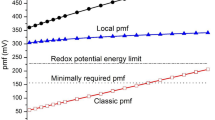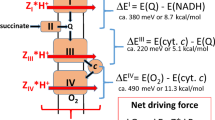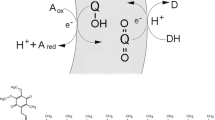Abstract
OVER the past decade, evidence has accumulated that fragments of cellular membranes exhibit ATPase activity which is dependent on sodium ions and inhibited by ouabain, and which is probably involved in the active transport of sodium and potassium ions1. Another type of cation transport, characterized by an insensitivity to ouabain and coupled directly to the energy transfer system of the respiratory chain, has been demonstrated in isolated mitochondria. Interest in this system has been concerned primarily with the transport of divalent cations, and their exchange with hydrogen ions2, but it is now obvious that a similar mechanism can operate for the transport of monovalent cations, provided that the mitochondria are treated with certain polypeptide antibiotics. Valinomycin specifically promoted the uptake of potassium, rubidium and caesium ions3,4, whereas gramicidin also activated uptake of sodium and lithium ions by isolated mitochondria5.
This is a preview of subscription content, access via your institution
Access options
Subscribe to this journal
Receive 51 print issues and online access
$199.00 per year
only $3.90 per issue
Buy this article
- Purchase on Springer Link
- Instant access to full article PDF
Prices may be subject to local taxes which are calculated during checkout
Similar content being viewed by others
References
Skou, J. C., Physiol. Rev., 45, 596 (1965).
Ernster, L., and Lee, C. P., Ann. Rev. Biochem., 33, 729 (1964).
Pressman, B. C., in Energy-Linked Functions of Mitochondria (edit. by Chance, B.), 181 (Academic Press, New York, 1963).
Moore, C., and Pressman, B. C., Biochem. Biophys. Res. Commun., 15, 562 (1964).
Chappell, J. B., and Crofts, A. R., Biochem. J., 95, 393 (1965).
Gornall, A. G., Bardawill, C. J., and David, M. M., J. Biol. Chem., 177, 751 (1949).
Maizels, M., Remington, M., and Truscoe, R., J. Physiol., 140, 61 (1958).
Dallner, G., and Ernster, L., Exp. Cell Res., 27, 372 (1962).
Pressman, B. C., Proc. U.S. Nat. Acad. Sci., 53, 1076 (1965).
Van Rossum, G. D. V., Biochim. Biophys. Acta, 82, 556 (1964).
Hempling, H. G., Biochim. Biophys. Acta, 112, 503 (1966).
Rasmussen, H., Fischer, J., and Arnaud, C., Proc. U.S. Nat. Acad. Sci., 52, 1198 (1964).
Whittam, R., in The Cellular Functions of Membrane Transport (edit. by Hoffman, J. F.), 139 (Prentice-Hall, Inc., Englewood Cliffs, N.J., 1964).
Author information
Authors and Affiliations
Rights and permissions
About this article
Cite this article
GORDON, E., NORDENBRAND, K. & ERNSTER, L. Evidence for a New Mechanism of Respiratory Stimulation and Proton Ejection in Ehrlich Ascites Tumour Cells dependent on Potassium Ions. Nature 213, 82–85 (1967). https://doi.org/10.1038/213082a0
Received:
Issue Date:
DOI: https://doi.org/10.1038/213082a0
This article is cited by
-
Potential rapid evaluation of chemical antineoplastic activity based on critical stability limits of ionic homeostasis
Pharmaceutical Chemistry Journal (1982)
-
Effects of valinomycin, ouabain, and potassium on glycolysis and intracellular pH of Ehrlich ascites tumor cells
The Journal of Membrane Biology (1971)
-
Effect of Valinomycin on Net Sodium and Potassium Transport in Ehrlich Ascites Tumour Cells
Nature (1967)
Comments
By submitting a comment you agree to abide by our Terms and Community Guidelines. If you find something abusive or that does not comply with our terms or guidelines please flag it as inappropriate.



